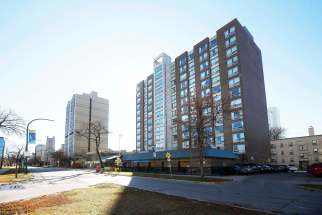Winnipeg School Division flunking communication, critics charge Public unable to access board meetings in person or online despite legislative mandate
Read this article for free:
or
Already have an account? Log in here »
To continue reading, please subscribe:
Monthly Digital Subscription
$19 $0 for the first 4 weeks*
- Enjoy unlimited reading on winnipegfreepress.com
- Read the E-Edition, our digital replica newspaper
- Access News Break, our award-winning app
- Play interactive puzzles
*No charge for four weeks then billed as $19 plus GST every four weeks. Offer only available to new and qualified returning subscribers. Cancel any time.
Read unlimited articles for free today:
or
Already have an account? Log in here »
Hey there, time traveller!
This article was published 18/10/2020 (1531 days ago), so information in it may no longer be current.
While some Winnipeg School Division teachers livestream their lessons, their employer — the largest board in the province — is not broadcasting meetings for viewers to watch in real-time.
School trustees have adjusted the ways they conduct meetings in recent months because of new COVID-19 public health orders that mandate physical distancing in boardrooms and complicate open-door meetings.
The River East Transcona, Seven Oaks, Louis Riel, Pembina Trails and St. James Assiniboia school boards have each set up opportunities for members of the public to attend meetings virtually and, in some cases, in person.
At the Winnipeg School Division, only delegations can sign up to join and present during live meetings on videoconferencing platform Microsoft Teams. The division’s six active trustees join the platform from their physically distant seats in the boardroom on Wall Street.

“We don’t have the technology to be able to broadcast,” said Radean Carter, senior information officer at WSD, which includes approximately 33,000 students in 79 schools in central Winnipeg.
Citing a challenge of livestreaming quality audio when trustees are spaced out in the room, Carter said WSD is uploading videos of board meetings after the fact.
She said upgrading technology would be costly and making live meetings accessible isn’t a top priority for the division at present, so WSD’s goal is to put recordings online the day after a board meeting.
More than a month into the 2020-21 school year, WSD hasn’t posted any new videos to its YouTube page. The last meeting posted is from late August. There have been two since, on Sept. 14 and Oct. 5.
WSD to vote on Cecil Rhodes School
Winnipeg school trustees are expected to vote Monday on whether to consider renaming Cecil Rhodes School, a building whose namesake laid the groundwork for the racist apartheid system in South Africa.
During an evening board meeting, the Winnipeg School Division board is scheduled to debate and vote on a motion to ask administrators to begin consultations with students, parents and members of the community on renaming the school.
If approved as is, the motion will see administrators undertake consultations and provide an update before March 15, 2021.
Winnipeg school trustees are expected to vote Monday on whether to consider renaming Cecil Rhodes School, a building whose namesake laid the groundwork for the racist apartheid system in South Africa.
During an evening board meeting, the Winnipeg School Division board is scheduled to debate and vote on a motion to ask administrators to begin consultations with students, parents and members of the community on renaming the school.
If approved as is, the motion will see administrators undertake consultations and provide an update before March 15, 2021.
“With all the positive feedback I’ve received, I hope that my fellow trustees stand with me against white supremacy and the figures who have promoted racist policies at home and abroad,” said trustee Jennifer Chen, who created the motion, during an interview Monday afternoon.
Chen informed her fellow trustees about the motion before the board went on summer break. She said she was motivated by both the Justice 4 Black Lives Winnipeg rally in June and a petition to rename the school, which has collected upwards of 1,700 signatures.
The U.K.-based Rhodes Must Fall campaign has also penned a letter of support to Chen.
Rhodes, who is widely known for having founded the prestigious Rhodes Scholarship, held racist beliefs throughout his lifetime. The former prime minister of the Cape Colony, which would become South Africa, Rhodes’ beliefs laid the groundwork for apartheid’s system of policies that favouried white citizens over their Black and “coloured” neighbours in all areas of life.
Jon Young, a professor emeritus of education at the University of Manitoba, said boards exist — as outlined in the Public Schools Act — to be responsive to local needs and ensure public participation in education decision-making. Meetings allow people to participate in listening to deliberations and speaking, he said.
“It is important for school board meetings always to be as publicly accessible as possible — and perhaps never more so than during this pandemic,” said Young, who has researched public school boards, in a statement to the Free Press.
“At a time when parents are looking to educators to meet the challenges of safe, face-to-face and distant learning, and teachers and principals are working hard and creatively to meet this challenge, ‘audio challenges and expensive tech upgrades’ is hardly a reassuring explanation.”
Todd MacKay, prairie director of the Canadian Taxpayers Federation, echoed those sentiments Monday, calling the scenario “a huge problem.”
“For them to fail to do that is extraordinarily incompetent and frankly, offensive to their core mandate, which is being accountable to citizens and taxpayers and parents and students and everybody else,” MacKay said.
“The public should be able to engage as part of a public board meeting.”– Alan Campbell, president of the Manitoba School Boards Association.
As far as MacKay is concerned, WSD can make an easy adjustment by using an iPhone to livestream its meetings or finding a school gymnasium to hold meetings where the public can attend safely.
North of Winnipeg, the Interlake School Division has been renting a community space far bigger than its rural board office to hold meetings with physical distancing.
New public health protocols that went into effect Monday mean the meetings will go virtual again, but trustee Alan Campbell said the public will be invited via a livestream link.
“The public should be able to engage as part of a public board meeting,” said Campbell, president of the Manitoba School Boards Association.
The Public Schools Act states boards are to hold meetings “openly” and no one is to be excluded or removed, unless there is improper conduct.
Under the Emergency Measures Act, the province has suspended a provision that requires trustees to attend in-person meetings, but Campbell said he was not aware of any changes allowing boards to exclude members of the public.
A spokesman for Manitoba Education said Monday the department is reviewing the matter to ensure the act is being followed.
maggie.macintosh@freepress.mb.ca
Twitter: @macintoshmaggie

Maggie Macintosh
Reporter
Maggie Macintosh reports on education for the Winnipeg Free Press. Funding for the Free Press education reporter comes from the Government of Canada through the Local Journalism Initiative.
Our newsroom depends on a growing audience of readers to power our journalism. If you are not a paid reader, please consider becoming a subscriber.
Our newsroom depends on its audience of readers to power our journalism. Thank you for your support.





